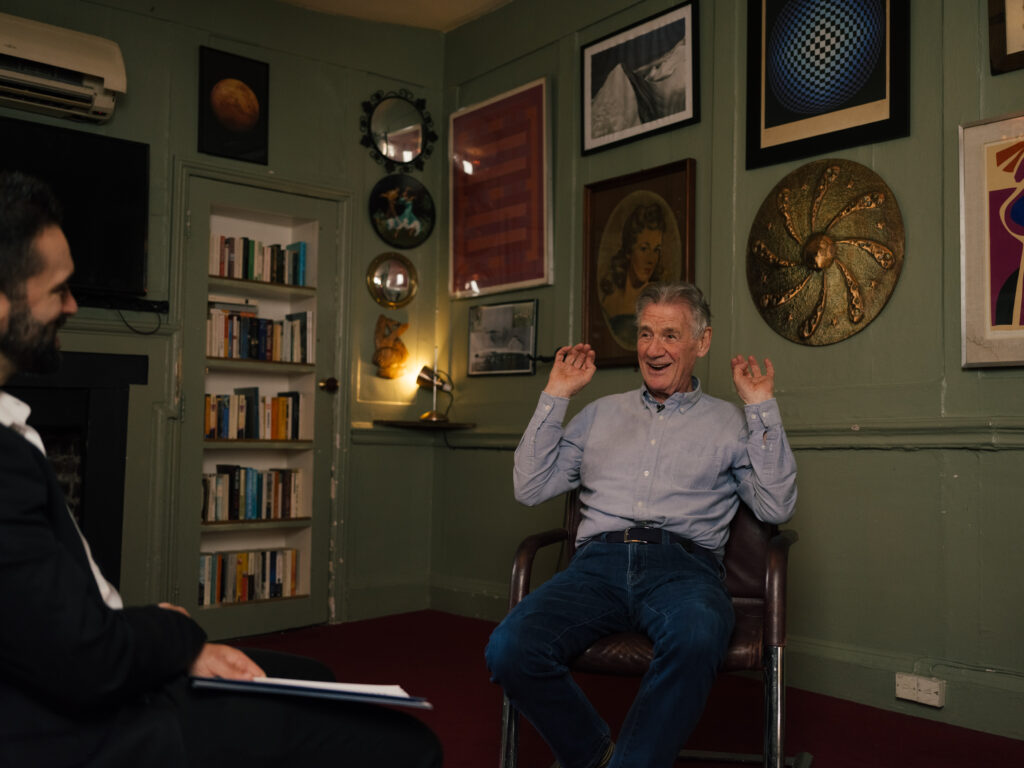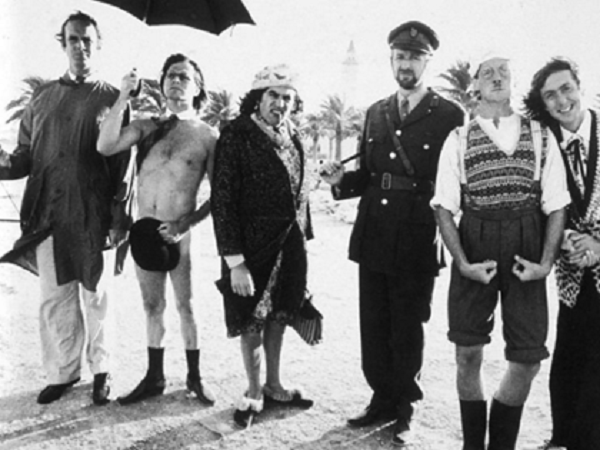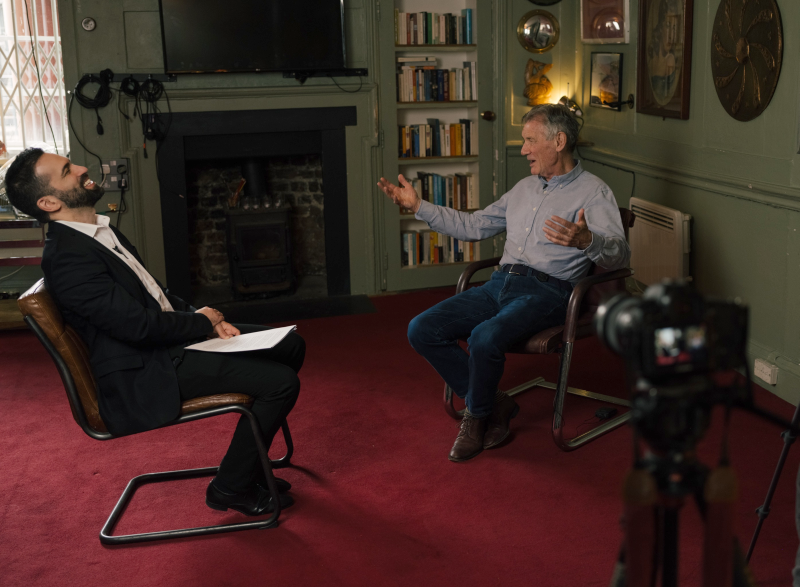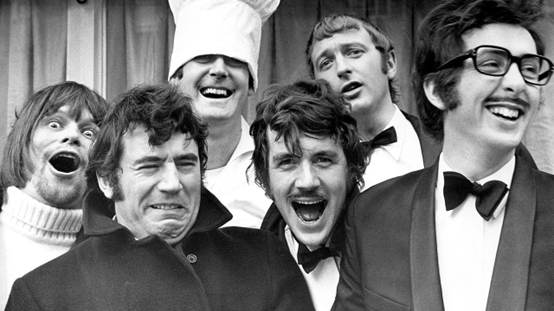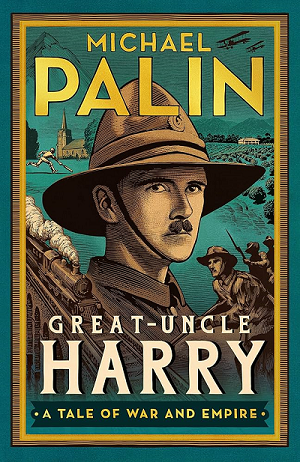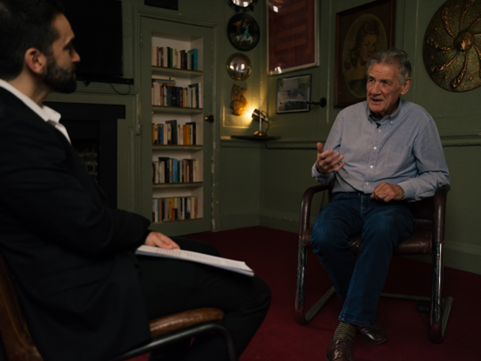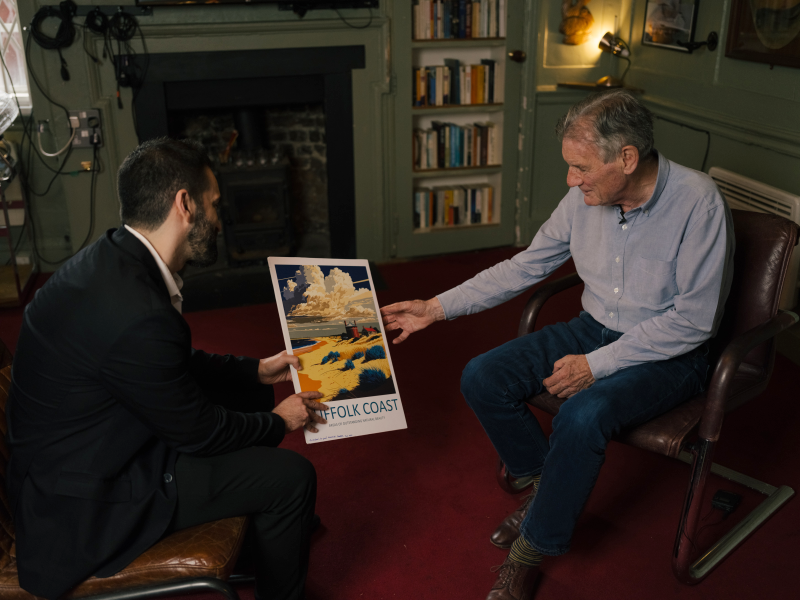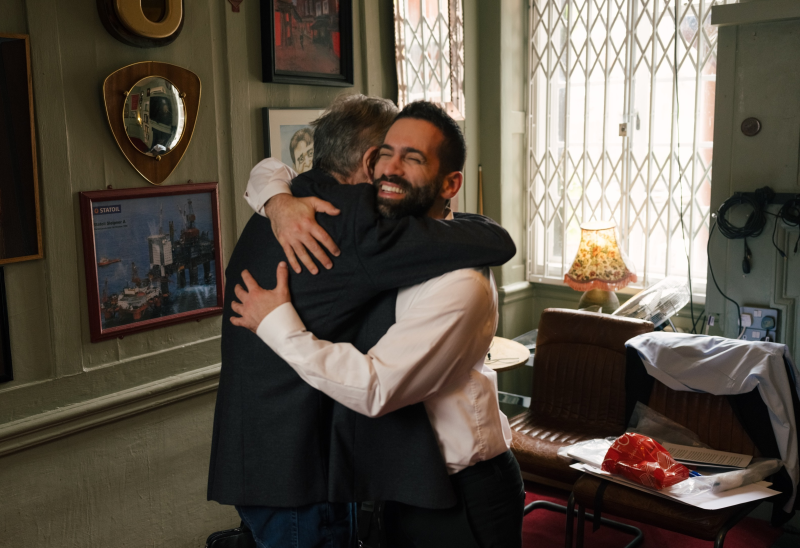He founded the legendary Monty Python gang, created cult films, presented one of the most successful travel series in the world, and made masterful documentaries about art.
In a rare interview with Israeli journalist Yonatan Gat, Sir Michael Palin, who turned 80 last year, reveals the secrets behind the creation of the famous sketches (“what others left on the cutting-room floor – we decided to broadcast”), speaks about the reunion show (“It was like a strange dream”) and about life after the passing of his wife (“I’m on this journey alone, now”) and proclaims: ” Monty Python has completed its journey.”
Yonatan Gat, London / Translated with the assistance of Daniel Isaacs
Will you offer us a hand? Every gift, regardless of size, fuels our future.
Your critical contribution enables us to maintain our independence from shareholders or wealthy owners, allowing us to keep up reporting without bias. It means we can continue to make Jewish Business News available to everyone.
You can support us for as little as $1 via PayPal at office@jewishbusinessnews.com.
Thank you.
“It’s kind of you to call me ‘Sir,’ but you don’t have to,” Sir Michael Palin says as we sit down for our conversation at his favorite club in London’s Soho. “I rarely use this title. Except when I want to make a reservation at a restaurant.”
How ironic it is that the man who played the character of the knight who says ‘ni’ in the movie “Monty Python and the Holy Grail” received a knighthood from the British kingdom in 2019.
“It’s very strange,” he laughs. “Who would have believed that that silly knight would become a real knight? I had no idea that would happen to me. Comedians don’t usually get knighted.”
But the man sitting in front of me is not just another comedian. Michael Palin is one of the most influential people in the history of humor in the 20th century. The man who founded the most celebrated and eminent comedy troupe in television and film history, who elevated the nonsense genre to an art form and created films that are quoted by millions worldwide, can now sit back in his chair and relax knowing that his name will forever be inscribed in the chronicles of Comedy. We are meeting again, 9 years after our previous encounter, this time on the occasion of his eightieth birthday celebrations. He looks much younger than that, athletic in appearance, and with the same boyish and playful air. In our conversation, he gazes back with pleasure at the chaos he and his gang brought to television in the late sixties.
From “Monty Python’s Flying Circus,” 1972:
Moderator: “Good evening, and welcome to the Arthur Ludlow Memorial Baths, Newport, for this year’s finals of the All-England Summarize Proust Competition. As you may remember, each contestant has to give a brief summary of Proust’s ‘A La Recherche du Temps Perdu’, once in a swimsuit and once in evening dress”.
Host: With us is Harry Bagot. And Harry, what are your hobbies outside summarizing?”
Contender Harry Bagot: ” Well, strangling animals, golf and masturbating.”
Voice Over: “Well there he goes. Harry Bagot. He must have let himself down a bit on the hobbies, golf’s not very popular around here”.
This hilarious and disturbing skit is just one of countless cult sketches created for “Monty Python’s Flying Circus”, in which Palin teamed up with John Cleese, and were then joined by four other friends: Graham Chapman, Eric Idle, Terry Jones, and animator Terry Gilliam. Together, they created radical nonsense that had never been seen before. The Pythons confused and confounded the polite, stiff-upper-lip of the British public using sketches with no punchline, fragmented scenes, blatant nudity, and surreal animation. The show created a new stream of humor, which was completely nonsensical.
You called your first episode “Whither Canada?” But there was not a single mention of Canada in the entire episode.
Palin: “Right.”
And when asked why you called it that, your answer was that it sounded like the most boring documentary in the world.
“Exactly,” he chuckles with satisfaction.
It almost looks as though you were working hard to push the audience away, but still they came to see you.
“To understand this – you have to look at the television of that time. It tried to appeal to the audience. The presenters were smug, and everything on screen was smiles and positivity. And I thought that there was a large audience, especially young people of that time, who were saying to themselves, ‘Wait, it shouldn’t be so sugary, or so schmaltzy. What would happen if something went completely wrong? That’s something we’d love to see’.”
And you provided that disruption. For example, you took the time to travel to a distant mountain to film a short landscape segment with a Viking, just to have it intentionally interrupted by an announcement that said: “We apologize for this unrelated segment. We are now returning to the studio.”
“We liked to do things that had no explanation. On the other hand, the show was scripted from A to Z. We would sit around the table together, and someone would say, ‘Let’s cut to a scene with a Viking who says something silly.’ And that would move you on to the next sketch. There were also things that we did very quickly. For example, in one sketch, I played a TV presenter, and when the camera swoops into the desk, and as it swoops in – there is a big sign right above me that says, ‘Is the Queen sane?’ for a split second. If you blink – you miss it. That may be the reason why people watch Monty Python more than once.”
So, if there was no sense in what you did, how did it catch on so well?
“You see, It was a mix: on the one hand, we had classic sketches. On the other hand, short segments that might have been left on the cutting-room floor in other programs. We made sure they got in. In those days there were good satirical programs and very successful situation comedies, but ‘Flying Circus’ was bits and pieces that we put together in a shape and form that nobody else was able to do. There hadn’t been a show like it on television before, really”.
Looking back, it’s amazing that you dared to do such things at the BBC.
“We were very confident that if we found it funny, then we’d do it. And usually the key to Python is to do it very seriously. We took completely ridiculous situations and presented them in a very serious way. I mean, John Cleese, for example, is a formidable man. He studied law. He’s tall. When he says something – you can believe it. So, when he starts talking about something very silly like a ‘Concorde sheep’ with his French accent – it’s very funny. And the six of us were all performers who kind of complemented each other, everyone had their own thing they could do, and that was really important, it gave us a great deal of range. If Cleese was the authority, Terry Jones could play his mother, with that wailing voice, like in the role of the mother in the movie ‘Life of Brian’ who says “He’s not the Messiah, he is a very naughty boy!”. Everyone brought along something different. So, there was kind of joyfulness about how the shows were done. I think it made it quite infectious.”
From “Monty Python’s Flying Circus”, 1969:
Robber: “Good morning, I am a bank robber. Er, please don’t panic, just hand over all your money”.
Assistant: “This is a lingerie shop, sir”
Robber: “Fine, fine, fine. Adopt, adapt and improve. Motto of the round table. Well, um… what have you got?”
Assistant: “Er, we’ve got corsets, stockings, suspender belts, tights, bras, slips, petticoats, knickers, socks and garters, sir.”
Robber: “Fine, fine, fine, fine. No large piles of money in safes?”
Assistant: “No, sir.”
Robber: “No deposit accounts?”
Assistant: “No sir.”
Robber: “No piles of cash in easy to carry bags?”
Assistant: “None at all sir”.
Robber: “No luncheon vouchers?”
Assistant: “No, sir”.
Robber: “Fine, fine. Well, just a pair of panties then please”.
Michael Palin was born in the city of Sheffield in South Yorkshire. As a young child, he loved performing and reciting Shakespearean monologues to his mother. He grew up listening to “The Goon Show”, the famous radio show that starred comedians Peter Sellers and Spike Milligan, and at school, he was known as a successful imitator of the teachers.
His conservative father feared his son would be a thespian with no stability or future, but his mother encouraged him to pursue his passion. His father must have been comforted when Oxford accepted the young Palin to read history. But his attention was focused on the “Oxford Revue,” a prestigious acting club at the university. There, he met Terry Jones, who would become his good friend, and together they started performing. In 1965, he was invited to appear on his first TV show, “NOW!”. Together with Jones, he began writing for David Frost’s “The Frost Report”. And it was there that they met with the rest of the future members of “Monty Python.” Yet although the television series they created in 1969 is now considered a masterpiece that is broadcast worldwide to this very day (currently on Netflix), the inception, alas, was not entirely promising.
“When we started making ‘The Flying Circus’, we were very worried about who would watch this content. Who would it speak to? When we did our first studio recording the audience came in, but the BBC knew nothing about the program, and they gave tickets to the same audience who usually went to regular variety shows. So, there were a lot of old ladies in our studio who were completely bewildered by our jokes about Marcel Proust. And the first four to five shows, I think we were all very nervous that this would be it – we’d do one series and nothing more. So it took some time for us to align with the audience. But in the end, we found them.”
Sometimes, you finished a skit with one of the participants turning to the camera and saying, “This is the silliest sketch I’ve ever been in”
Palin: “Right” (giggling)
Perhaps the uniqueness of your sketches may be that they contradicted themselves: on the one hand, you had the urge to create a skit, and on the other hand, the urge to destroy it. It has a built-in self-destruct mechanism. The sketch attacks itself, like an autoimmune process, and what attracted the audience was this opposing struggle.
“I think you describe Monty Python very well. It’s interesting. The show pulled in opposite directions. On the one hand, we thought about what would make the audience laugh and, on the other hand, how to challenge them. Sometimes sketches seemed to lead somewhere, but in the end, they were completely pointless.
For example, the long sketch about the cheese shop:
John Cleese comes into the shop, and I’m the salesman. He asks if there’s camembert, and I say, ‘No, sorry.’ So he asks if there’s cheddar, and I say, ‘Not today, Sir.’ Then he asks if there is roquefort, and I tell him, ‘The cat has just eaten it, sorry.’ And so he goes on asking for dozens of names of cheeses and it slowly becomes clear that there are no kinds of cheese in the store at all. Nothing. So the skit is slowly emptied of its content. And throughout the dialogue, all of this is happening too – there are two drunken dancers in the background and a third person playing a balalaika. And it’s quite annoying. In the end, John Cleese turns to them and shouts, “will you shut up?!” It’s hilarious when John does it. So it’s someone who’s trying to achieve something, but the subject gets messed up until there is no meaning left.”
So, the approach of spoiling the sketch for yourselves helped you be non-didactic comedians. You didn’t have to convey a message.
“Exactly. We didn’t want to be didactic. We said to the BBC, ‘We don’t want to be didactic,’ and they said: ‘What does ‘didactic’ mean?’ So we probably lost them there.”
At a casual glance, one might suspect Palin of being a polite British gentleman, a typical Oxford graduate, who behaves according to the kingdom’s code of etiquette. But while that is indeed the case, it does not do justice to his history as the person who “moved the cheese” for the British public, pushing content onto it that no one had dared to deal with before.
One of the famous skits that he is identified with is “Lumberjack Song,”
About a barber who leaves his job and begins to sing: “I’m a lumberjack, and I’m okay” with a choir of Canadian mounted policemen accompanying him in the background. During the course of the song, he reveals that he likes to dress in women clothing. The chorus us forced to repeat his words and when the text escalates (“I cut down trees, I wear high heels, suspenders and a bra. I wish I’d been a girlie, just like my dear Papa”) the chorus starts to feel disturbed and leaves.
There isn’t a Brit who doesn’t know this song by heart.
How did you write that?
“Well, first of all, you sit down and write. The way we worked was in pairs. I wrote with Terry Jones. I liked the idea of a homicidal barber who has a murderous pathological problem.
He is smeared with blood, and his hands are shaking with the desire to murder his clients. Then we thought – where is it going to go? So we took it in the direction of a lumberjack.”
Why on earth did you take it in that direction?
“I’ll tell you. It’s because we didn’t know how to lead into the next sketch. We suddenly thought that maybe the homicidal barber should turn to the audience and say, ‘I never wanted to be a barber anyway…I wanted to be…’ then we asked ourselves – what’s the most ridiculous thing a barber would want to be? So our answer was – maybe a lumberjack?”
So it just popped into your head?
“Yes. It just pops into your head. And then you get on a bit of a roll and think to yourself – what does a lumberjack do? Does he just cut down trees? Maybe we’ll do a song? Yes! Let’s make it into a nice little musical! So, the lumberjack song was born because we didn’t have an ending to the sketch about the homicidal barber. And that’s how it developed with the girl who came up next to him. And if we use your theory about our humor and the internal tension within the sketch, it ends up with the crowd throwing eggs at him and yelling at him to ‘go away!’…”
And then you read out a letter to the BBC complaining about the broadcast of your own sketch.
“Exactly, we read out a lot of letters of complaint against ourselves. That was a very good little technique we used. We preempted the audience.”
And that’s how you took the sting out of the actual complaints against you.
“Exactly,” Palin smiles with pleasure.
Very cunning of you.
“Yes. You see, we were all brought up in universities like Cambridge and Oxford, so we knew what the official tone should sound like. When we read out a letter like ‘Dear Sir, it is absolutely disgusting and shocking…” it sounded convincing.”
From “Monty Python’s Flying Circus,” 1969:
Man: “Inspector! Inspector!”
Inspector: “yes?”
Man: “I’m terribly sorry but I was sitting on a park bench over there, took my coat off for a minute and then I found my wallet had been stolen and £15 taken from it.”
Inspector: “Well did you er, did you see anyone take it, anyone hanging around or…”
Man: “No no, there was no one there at all. That’s the trouble”.
Inspector: “Well there’s not very much we can do about that, sir”.
Man:…
Inspector:…
Man:…
Inspector:…
Man: “… Do you want to come back to my place?”
Inspector: “… Yeah all right.”
“I think you describe Monty Python very well. It’s interesting. The show pulled in opposite directions. On the one hand, we thought about what would make the audience laugh and, on the other hand, how to challenge them. Sometimes sketches seemed to lead somewhere, but in the end, they were completely pointless.
There was a lot of reference to LGBT issues in your sketches, which was relatively rare in 1969.
“I think we dealt with it because it’s the kind of thing that would have been a shock for the audience. One of my favorite sketches is the one with the policeman I invited to come back to my place. It’s interesting to think about it in the context of these days. Because you might say that a lot of policemen were from the gay community back then, so what’s weird about that? But, back then, the perception was that police officers couldn’t be gay. Perhaps even seen as anti-gay. So suddenly, seeing this kind of dialogue seriously shocked the viewers. And I knew it would make the audience laugh. We tried to stretch the boundaries without being offensive, but to create a silly situation.”
People are more easily offended in this age of political correctness.
“I think PC is a new kind of establishment. When we formed the Monty Python gang in the late sixties, the establishment was the army, the church, politicians. These people got us out of the war, rebuilt the country, and were considered respectable. But for young people then, it was boring to hear the same voices repeatedly telling you what was right and what was good. So, it was bold to laugh at them. Now, there is a different kind of establishment, and that is one of people who can discuss any issue, but take it very seriously. I mean, they could look at this sketch and say, ‘why can’t a policeman do what he wants sexually?’ This is the new establishment. Therefore, if you want to create good comedy, it will be tougher for you now. You must consider that some people will be very easily offended.”
And when Palin talks about humor that might hurt the audience’s feelings, he knows what he’s talking about. After all, he and the Pythons created the blockbuster “Life of Brian” which mocks religious officials and people who unquestioningly flock to spiritual leaders. The film caused a worldwide uproar, and the church moved to ban the viewing of the film. But in practice, that was the best PR the Pythons could have wished for and the film became the most profitable of the bunch. One of the most famous scenes in the film is of an excited crowd who mistakenly thinks that an ordinary guy named Brian is the Messiah. When he tries to explain to the audience that he is not a saint, the following famous dialogue occurs:
Brian: “You don’t have to follow me. You don’t have to follow anybody! You have to think for yourself. You are all individuals!”
The crowd of believers shouted in unison: “Yes! We are individuals!”
Brian: “You’re all different.”
crowd: “Yes! We are all different.”
A lone person in the crowd: “I’m not.”
“When this film was released in 1979, John Cleese and I were invited to appear on the Nightly Talk Show to talk about the film and confront two other guests: a bishop and a satirist named Malcolm Muggeridge, who was a famous satirist who had completely turned around the other way becoming conservative in his taste. And what happened was that the bishop and Muggeridge dismissed us. The bishop leant back and said: ‘Well, I’m a bishop, audience! I’m the person you believe. These people are alright, but they are silly little boys, doing silly things. It’s not important…’ and he got it completely wrong!”, emphasizes Palin. “Because at that time, the audience didn’t believe that bishops knew how comedy should be or how taste should evolve. It was a changeover moment. The audience realized that you could write a comedy about religion which would still be funny. I felt at that moment that something had really changed and that bishops would not be able to get away with that ever again”.
Weren’t you afraid of making “Life of Brian”?
“Maybe a bit. But it’s the kind of thing that keeps us going…”
It seems that the era of political correctness and diverse representation does not know how to digest the Python gang, even though the demand for them is still high. A few years ago, the former head of the comedy department at the BBC, Shane Allen, said that “a show featuring ‘six white Oxbridge blokes’ would be shunned by the BBC, as they try to diversify their programs.’”
Palin reacts to this with embarrassment. “What can I say? It’s probably true. You heard the program manager. It must have slipped out. He’s probably right. Diversity means letting people from different backgrounds participate in television. I guess that’s what he meant. So there we are. Six people who come from the same background, and don’t forget – we were also privileged!”
Exactly. You came from Oxford and Cambridge.
“That’s even worse. If we were six plumbers from the West End, the BBC would say, ‘Oh, that’s very interesting.'”
It sounds like a Monty Python skit
“Right. I think that’s why Monty Python is still relevant.”
In 1989, Graham Chapman, the troupe’s sixth member, died of throat cancer at the age of 48. Shortly before that, the Pythons were still trying to reunite for their 20th-anniversary celebration, that was to be presented by Steve Martin. The attempt failed, and the last sketch starring the entire group of six was shelved and never aired. Palin reveals to me the reasons for this.
“It didn’t work at all. The first mistake was doing it for the 20th anniversary. Anniversaries are establishment things. People love anniversaries. There’s always 25 years for this and 30 years for that and it’s not a good reason to do it! You’re supposed to create because you have something meaningful or funny to say and not just because it’s the 20th anniversary of your first show. That was the initial problem. We took the occasion far too seriously. The other problem was that Graham Chapman was very ill at the time. He had lost a lot of weight and didn’t have long to live, actually. So that was odd. And Steve Martin, whom we all regard as a brilliant comedian and one of our heroes – was sort of trapped in this material. And he was trying to make Python stuff, but he should have done his own stuff in his own way. So, it was an unholy mix and it just didn’t work.”
Since Chapman’s death, the Pythons vowed never to reunite. In 2014, however, they broke their oath and put on 10 shows at the O2 in London. All 16,000 tickets for the first show were sold out in just 43 seconds, and all other 9 shows sold out quickly.
Palin beams when I ask him about the event.
“It was extraordinary. Monty Python had never appeared before such a large audience. At first, I was worried. I was wondering how we would be able to perform in such a huge stadium with our intimate sketches like ‘The Dead Parrot’ and ‘The Argument Clinic’. These are sketches that have such small nuances. But when we went on stage, there was a huge roar from the audience, and I realized that they were simply happy that we were there. After all, we hadn’t performed since 1980. I realized that being accurate with the text was not what was important. What was important was to have fun. We were already over seventy years old; for some of us, even climbing the stairs to the stage was exhausting. But we felt like we were going back to our youth again because it was so much fun with the audience. My wife Helen, who rarely came to see things I do – came almost every night.”
What was your feeling at the last show when you bowed for the last time?
“It was amazing. Seeing such an audience standing and clapping non-stop is not something that really happens in life. It’s like a strange dream. Most of my dreams are usually the opposite – I dream I’m on stage and don’t remember my lines. It was the first time I felt closest to understanding what Monty Python meant for people.”
When we met before the 2014 show, you told me that you had gotten together so that Terry Jones could pay his mortgage. The reunion was due to financial needs.
“True, the truth is that that was the main reason we did it. Largely. But in this case, Terry Jones’ mortgage was a very good thing for us all.”
Did you know that it would be the last time you would perform together?
“Yes, we all agreed on that. It started when we agreed that we would do 3 shows. And it was quite something for us all to come together and agree on that. The next thing I knew was that the tickets had sold out very quickly. So we said ‘alright, then we’ll do 5 shows’. And I remember I had to go up to Scotland and on the way back on the train I got a call asking ‘could you do 8 shows?’. I said to myself, ‘oh my God’. So eventually we agreed on 10 (laughs). So that’s how unprepared we were for the audience’s reaction.”
So you had already thought about the idea that that would be the end of Monty Python.
“Yes, I’m probably the most extreme of all of us. I thought that Python was over in 1983 with our last film “The Meaning of Life”. We had had very successful TV shows, the group had broken up after that, quite naturally, we were very lucky to have a second bite of the cherry by doing films, and we have managed to have 3 very successful films. But even then, with “The Meaning of Life” I felt that this was the last film that we were going to do. So, yes. I felt, at the end of the stage show that this was going to be our farewell. During the eighth show, I was backstage with John Cleese, and he said, ‘Listen, I wouldn’t want to keep doing many more of these. I’m getting a little bored’. Boredom is something the Pythons always had to avoid. But in the end, we didn’t get bored. We stopped at the right time. People suggested that we continue the show in other places. The idea of going on tour in Australia, America, or Israel would not have worked. It was pretty exhausting. And we would have had to spend an enormous amount of money on the set and the dancers to get the same feeling. I thought we were never going to do better than this. We would never get a reaction from the audience that would be better than that. Therefore, it was time to stop.”
Over the last three years, during the pandemic, Palin wrote a book called “Great Uncle Harry.” A book that traces the footsteps of a forgotten relative, his grandfather’s brother, who was killed in the First World War, but whose details were not known. With the help of detective-like skills in an attempt to find clues about the life of the long-lost Harry, Palin sweeps the readers through a recreation the experiences of those disheartening days of the war, together with a sense of the great power of the British Empire. The result is a fascinating and very original book in its historical approach, that cannot be put down.
“I came across his name for the first time when I was looking at a collection of family papers, and there was a one framed picture of a man with a bush hat in uniform, looking at the camera, sort of challengingly. I remember asking the family who he was, and they said ‘we don’t know much about him’. He died in the First World War. The only one in my family who had been killed in the war. And I became quite fascinated with him. I asked myself – what is going on here? Why don’t we know anything about him? So, the challenge was to try and investigate what had happened to him.”
How did you do it?
“His father was a great record keeper. So there was a lot of material about the family’s life from the moment he was born. I got access to the archives of the school he attended. He went to India to try work on the railways, and on a tea plantation, and there, too, there was documentation and reports of his work. All of it showed that he was not a great success at anything. I asked myself if it was because he was so thick, and stupid, and hopeless. But, you know, that’s not an answer you can accept. So, I thought that this was a man who didn’t fit in. He looked like a drifter, at a time of complete confidence – it was the height of the Victorian watershed empire. It had sort of the biggest army, the biggest economy – when he was born. But at the age of 30, he died, in the mud in Flanders.
All this success and the feeling of power – that was the thing it was reduced to – people had been slaughtered in order to gain a few more feet of ground. So I told myself that he was a man I quite liked. He didn’t accept a traditional role. He didn’t become a clerk or a bishop. He drifted along. And that interested me. I wanted to know if this thesis of mine worked. And I think it did.”
Will you go on a book tour?
“Yes, I will. I’m just not sure how far I’ll go because it’s not the same energy when you’re 80 as I had for the last book. But when you publish a book now, you have to be prepared to go out and talk about it and sign and so on, certainly in this country, where it’s very competitive. But I’m looking forward to it.
After the Monty Python era, Palin became the presenter of a BBC travel series. He appeared in well-known films such as “Brazil,” and “A Fish Called Wanda”. He created great movies like “The Missionary” and “American Friends”. Later, he became the presenter of prestigious documentaries about his favorite painters, such as “The Mystery of Hammershøi,” “In Wyeth’s World,” “The Ladies Who Loved Matisse” and more; these films are absolute masterpieces and are a must-see for any art lover.
What drew you to making art documentaries?
“It started when Marie and Eleanor, who had produced and directed a documentary, asked to come to my house to talk, and to photograph the work of Anne Redpath one of the Scottish Colorists. I had bought some of her beautiful paintings. They are hanging in my house. This collaboration spawned more films. We approached the BBC and tried to convince them to make documentaries about artists we particularly liked and to make them in as different a way as possible.
“The Women Who Loved Matisse” is a film we made about the Cohen sisters, who very few people knew, but who are extraordinary collectors. Later on, one of the women in the production became interested in the works of Vilhelm Hammershøi, the Danish painter. And I was also very enthusiastic about him. I said to myself that this was one of the most remarkable artists I had ever seen. His paintings contain empty rooms with open doors and the presence of someone there. Mysterious and wonderful.
So we went to the BBC and offered to do it. Not only did the BBC let us make a program like this, we also got a cover in the “Radio Times” under the title ‘Michael Palin meets the Danish artist.’ The movie was very successful”.
Have you ever thought that the BBC wouldn’t have bothered making a film about topics like these if you hadn’t been the one leading it?
“That really could be. There is no doubt that we were unconventional creators in the field. Marie and Eleanor produced it wonderfully and took these issues seriously. For example, we approached the BBC and offered to make a film about a female artist because there was a feeling that there was a lack of representation of women in museums. This led to a film about Artemisia Gentileschi, who everyone now loves and talks about. It’s not necessarily because of our film. Still, people suddenly noticed a powerful and formidable artist here, with the great painting of Judith cutting off the head of Holofernes etc. It’s inspiring. We made a documentary about Andrew Wyeth. But there’s a lot more I’d like to explore, the work of Edward Hopper, for example. Brilliant.”
Do you find similarities between all the artists who intrigue you?
“Interesting question. I don’t think there is a direct similarity, but I definitely see, in the first documentaries we made, about Ann Redpath and the Scottish colorists – I see the connection to colorism there. The discovery of color as a creator of form. The same goes for Matisse. The later programs were about Hammershøi and Andrew Wyeth, who were realistic and very meticulous in the details related to everyday things. It could be just a face; it could be someone out in a field, and they knew how to capture it beautifully. And in their paintings, something is always going on in the background; something missing that causes you to ask yourself – what’s going on there? I like the way they enchant the viewer. Let’s say that the first programs dealt with artists whose paintings are full of joy and color and the later artists I dealt with were more restrained but no less powerful.
The past year, however, was not funny at all. Palin’s wife Helen, the mother of their three children, passed away following a long battle with a serious illness. It happened a few days before his 80th birthday. Instead of celebrations, Palin needed to recalculate his course.
“My wife, whom I had known for almost sixty years, died and you do look very carefully at what your role now is. I was one half of Mike and Helen. Now it’s just me. She was such a significant part of my life. I always consulted her about everything. Suddenly, I’m on my own. And then I ask myself – where do I go now? What sort of direction? What I do want is to continue working. This is very important. Because my brain is still ok, I think (laughs), but you’ve got to just still do things. And I’m very fortunate to have diversified in my work. So I get interesting offers from all sorts of areas. Maybe a film about an artist, or maybe another book, or comedy. So, I know that I won’t suddenly be adrift without a paddle. There will be someone who suggests things. I just hope that I keep going and doing interesting things. I’m lucky that I don’t stop and that others don’t let me stop, which is equally important. So I guess in a few years, you and I will be able to sit here…”
For another interview.
“Yes, I will have a doctor in attendance.”
I just wanted to ask how you are going to prepare yourself for our next interview.
“Yes, yes, I’ll prepare the coffin”.
God forbid!
Since it’s Palin’s birthday, I’m giving him a little gift I made in his honor: an old tourist poster of the Suffolk coast, where he and his late wife Helen first met in 1966.
“It’s very moving. It even makes me a little sad,” says Palin as he looks at the cartoon landscape of the poster. I see that his eyes are sad. But only briefly, as the smile rises on his lips once more, and he says: “Of course now, instead of the landscape, you see here in the poster- there are nuclear power stations.”
To end on a happy note, I surprise Palin with a birthday cake. His face lights up like a child’s before he blows out the candles. Before parting, I ask him to sign a book for me, not his own – but that of his teammate John Cleese. He laughs and signs it happily. We part with a hug. He glances back at the signed book I’m holding in my hand and says with his sly smile: “Well, this will probably be the most valuable copy he’s ever sold.”


